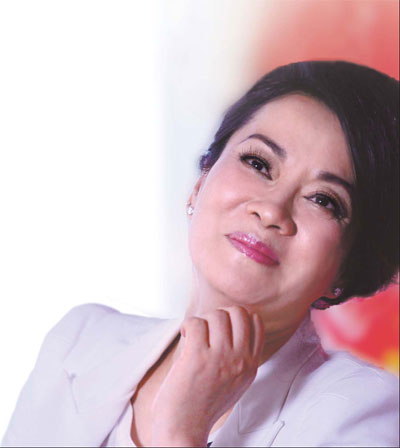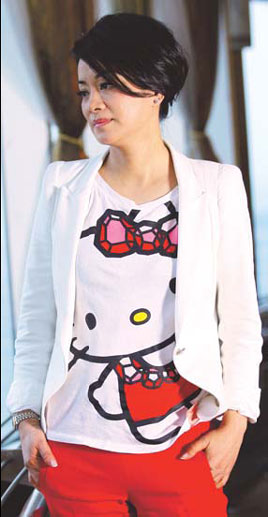Life and Leisure
Back to her best
By Chen Nan (China Daily)
Updated: 2010-12-14 08:06
 |
Large Medium Small |
|
Mao Amin, one of the country's biggest stars in the 1990s, is staging a revival. Photos by Zou Hong / China Daily |
Veteran entertainer Mao Amin is holding a comeback concert on New Year's Eve, signaling a fresh start to her 30-year career. Chen Nan interviews the star.
Slumped on a red sofa in a five-star hotel in Beijing, Mao Amin looks ecstatic. China's most famous female singer of the 1990s has been doing media interviews all day and she can expect more of the same after announcing she will hold a New Year's Eve comeback concert. The 47-year-old has every reason to be excited. It will be her first solo concert in 30 years. She says she can hardly believe she has been in show business so long.
"I will try to make the evening last," says the singer who would have to sing for three hours, every night, for a week, to cover all the popular songs from her 26 albums.
"I feel excited rather than nervous. The audience will understand the emotion I am feeling and I am looking forward to seeing them," she says.
For her first major media appearance in 10 years, Mao decided to go for the natural look. Unlike the graceful floor-length gown and high heels she often wore on stage in the 1990s, she matched red pants with green sneakers, a white Hello Kitty T-shirt and white blazer.
|
Singer Mao still looks glamorous in her 40s. |
"You are so chic," fans screamed, as Mao announced her upcoming concert on New Year's Eve at the Capital Stadium.
"Amin, I love you and all my family love you," shouted one 60-year-old woman who had taken her daughter with her.
"I think her songs are all great and I would particularly like to listen Yearning, like 10,000 times," the woman said.
She was referring to the theme song of the popular soap opera, Ke Wang (Aspirations), China's first long-running soap opera broadcast in 1990, episodes of which had an audience of about 550 million people.
When Mao, 1.72 meters tall and 55 kg, smiled like a veteran pageant queen and told her fans she would sing all her classic hits, the crowd went wild.
She said that she set the date of Dec 31, because, "I want to celebrate the coming new year on stage, which I missed very much".
Many of Mao's early hits were bombastic and slow, mainly for big galas and popular TV series.
"It's really unbelievable," she says. "I saw some young faces out there, who are at an age when they grew up with Jay Chou's music. Won't (the songs) be too formal for them?"
Born in Shanghai to an ordinary working class family, she became a child star in her neighborhood when she was 6, imitating singers from the radio, whether it was Peking Opera or pop songs.
Her silky voice enabled her to become a solo singer in a song and dance troupe of the People's Liberation Army in Nanjing when she was 23, even though she had little formal musical education.
"I had a teacher from Shanghai Music Conservatory. But I never practiced after class, because it didn't work for me," she recalls. "I believe singing is a blessed gift for me."
Mao first received significant attention when she won the Yugoslavian International Musical Festival with the pop song, Green Leaf and the Root, in 1993.
Her appearances at CCTV's annual Spring Festival Gala after 1988 further cemented her position as a household name in China.
"I enjoyed every moment on stage and I thought it was my fate. On those nights, when I look back one day and tell my grandkids, I will say, 'Yeah, I had that night when everyone stood up and I felt awesome,'" she says.
Known in her heyday as the country's biggest star, Mao was hit by a tax scandal in 1996, caused by her ex-boyfriend, who was also her agent.
Even now, she doesn't want to go into the details, but did say in an interview several years ago, "Those days almost killed me".
She withdrew from the public glare after the scandal and lived abroad in Canada and Britain, where, she says, she found inner peace again.
"Rumors were flying even abroad. I dared not look at Chinese newspapers and I even avoided going to Chinatown," she says.
But time was the best medicine and the situation gradually improved.
"Some guessed that I was put in prison and some said I was ill. I think that's the way. Not to talk about it in the press. I never complained and I don't want to start now. I think that's what's got me to where I am now. In the last 10 years, it's got much better and it's getting better all the time," she says.
"It is life and you move on. It's been very hard but I've got over it now. I am quite happy that it is still my voice that defines me."
She says she had an emotional breakdown because of the situation and what she says was the betrayal of her ex-boyfriend, but admits she grew as a person because of the experience.
Mao mentions the word "adjustment" five times during the interview.

"I really didn't know what to do with myself when I wasn't on stage then. But as time went by, I figured that I needed to make some changes," referring to her career and becoming the mother of a daughter and a son.
She has a regular life, gets up early, cooks and reads bedtime stories to her kids.
She has shown up on TV occasionally, including at the 2008 Beijing Olympic Games and some big variety shows, but says she's dedicated to being a mother.
"Being a full-time mother and wife is the happiest thing for me. I go to buy vegetables without cosmetics. I don't have to wear a pair of huge sunglasses to hide myself because no one can tell it's me. I look very different on and off the stage," she giggles. "That's exactly what I want."

